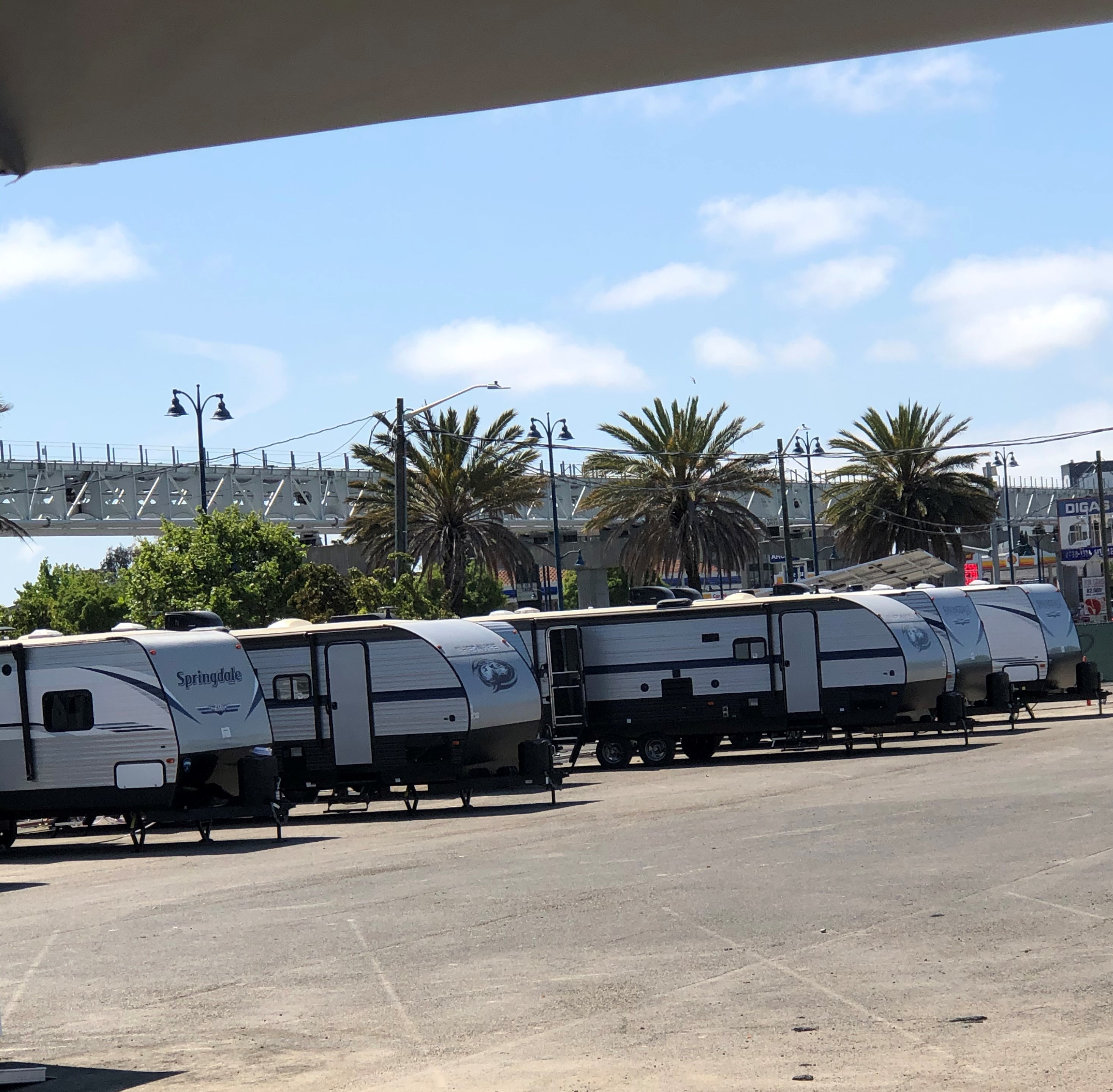Oakland, CA
– Mayor Libby Schaaf, Vice Mayor Larry Reid, and City Councilmember Loren Taylor joined with community and philanthropic leaders today to announce the opening of Operation HomeBase, a new COVID-19 isolation trailer program located on Hegenberger Road in East Oakland. The new trailers were donated by the State of California to the City of Oakland. Of the 91 original trailers, Operation HomeBase will use 67 trailers as a public health-driven intervention; the other 24 trailers were provided to the cities of Alameda, Berkeley, and Hayward, which requested them for their unsheltered residents. The primary goal of Operation HomeBase is to provide a safe place for high-risk people to self-isolate and maintain their safety and health. The target population is Oaklanders who are who are medically vulnerable and/or 65+ years-old, and at risk of serious complications from COVID19. “Our unsheltered residents are among the most vulnerable in our community. Many have underlying health conditions exacerbated by living outside on our streets. This intervention is a quick and compassionate step to slow the spread of COVID-19 and upgrade the living conditions of our unsheltered neighbors,” said Mayor Libby Schaaf. “I am grateful to Gov. Newsom and the State of California for the trailers, and I am thrilled to announce a grant award of $500,000 dollars by Taube Philanthropies to support this important initiative. We are deeply grateful to Tad and Dianne Taube for their generosity.” Vice Mayor Larry Reid, City Councilmember for District 7, said, “It’s critical to our collective health that the City is prioritizing residents in East Oakland who have historically been marginalized. COVID-19 has demonstrated that our most vulnerable Black and Brown populations—who already experience disproportionate levels of heart disease, asthma, lung disease, and hypertension, in addition to homelessness—are also most likely to become infected with and die of COVID-19. I am pleased that this intervention in deep East Oakland will help our community get the resources they need by opening a program specifically for them.” The site will be operated by Housing Consortium of the East Bay (HCEB), an experienced homeless services provider which currently operates the Lake Merritt Community Cabin site and two RV Safe Parking Sites for the City of Oakland (High Street and Coliseum). HCEB will provide 24/7 site management as well as programmatic staff and light-touch housing navigation (housing-focused case management) support. HCEB is prioritizing hiring staff with lived experience of homelessness including former residents of Community Cabins and Safe RV Parking sites. Residents will be supported with:
Linkages to healthcare, mental health, and addiction recovery services Assistance securing benefits, acquiring California ID, and seeking jobs The program will provide all basic needs, including three meals a day, on-site laundry service, and free wireless internet. Each trailer is large enough to allow ample physical distancing, and residents will share a trailer with a chosen roommate or partner; physical distancing guidelines will be maintained in situations where roommates are not partners. The program, which will serve a maximum of 134 people at any given time, offers: Security and privacy (one or two people per trailer with a lock on the door) Community tent with television, microwave, and water To be eligible to participate in Operation HomeBase, participants must be coming from one of the following living situations:
Participants must be either:
All referrals will come from designated street outreach providers (no walk-ins). All clients will be screened for COVID-19 symptoms before being admitted to the program. Initial referrals will come from nearby East Oakland encampments. Cost/Funding The start-up cost of Operation HomeBase trailer program is approximately $1.5M, with an annual operating cost of approximately $1.8M. Funding for the program is coming from the State of California’s Emergency COVID-19 response funds and a generous $500,000 grant from Taube Philanthropies, repurposed from the $1.5 million grant pledged in January to support the family workforce trailers program with Roots Community Health Clinic. The City also anticipates some amount of FEMA reimbursement for Operation HomeBase. Residents will be assisted to exit to permanent housing or to another stable transitional living situation. The City and Alameda County are committed to keep program participants from returning to the streets, and are in the process of developing exit strategies from trailers and hotels into transitional or permanent housing. Acknowledgements “I continue to be grateful to Jim Moore of Sustainable Urban Neighborhoods, and Mike Pyatok and Gary Struthers of Pyatok Architects, for their ongoing support of our various Community Cabin and Safe RV Parking sites. Their brilliant site planning and construction management expertise have made these projects possible, said Mayor Schaaf. “I also appreciate Alameda County Health Care Services Agency—Kathleen Clanon, Colleen Chawla, and Kerry Abbott—and especially Healthcare for the Homeless, for their leadership and partnership in addressing this crisis,” Mayor Schaaf said. Background: The Homeless Crisis and COVID-19 The 2019 point-in-time count estimated that there are 4,071 homeless people in Oakland, up 47% from two years ago. This represents about half of the total number of unsheltered residents in Alameda County. The City, in partnership with the County, is supporting a wide variety of interventions to address the COVID-19 risk among unsheltered individuals. This includes establishing this trailer site for emergency COVID-19 response housing. # # # |
City of Oakland Launches "Operation HomeBase" for Unsheltered Residents Vulnerable to COVID-19
67 new trailers will provide housing and services to support homeless older adults and medically vulnerable individuals.

Tagged with:
Was this page helpful?
Report a problem with this page